Bill James called Connie Mack’s move in the 1929 World Series, “the most brilliant managerial stratagem in the history of baseball”
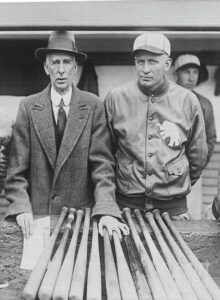
Connie Mack’s 1929 Philadelphia Athletics were one of the greatest teams in baseball history. With a lineup that included Hall of Famers Jimmie Foxx, Mickey Cochrane, and Al Simmons, they finished 18 1/2 games ahead of the second-place Yankee team that won 6 of the previous 8 American League pennants.
The Athletics pitching staff boasted a pair of aces with the left-right combination of 20-game winner Lefty Grove and 24-game winner George Earnshaw. For good measure, Mack’s #3 starter Rube Walberg had 18 wins of his own.
On May 12th Philadelphia moved into a first-place tie with the Yankees and never relinquished the top spot. By the end of the month the A’s were five games up. Their lead swelled to 10 1/2 games on August 1st behind Earnshaw’s 17th win of the season. The margin remained at double digits the rest of the way.
As Philadelphia cruised toward the AL pennant, the Cubs did the same in the National League. When Charlie Root shut down the Giants at the Polo Grounds on August 21st, the Cubs’ lead stretched to 10 1/2 games and never diminished.
The two teams were on a collision course for the World Series.
An aging veteran presents problems
Though his Athletics were coasting to a World Series berth, Mack still had issues to work out. In early August, 35-year-old pitcher Howard Ehmke veered toward earning his release. Six years removed from pitching a no-hitter in a 20-win season, Ehmke appeared in only 8 games by August. His first start that month against the Yankees was a clunker.
After allowing three first-inning runs, Ehmke opened the second frame by striking out Yankee pitcher George Pipgrass. He then allowed a double and two walks to load the bases. Up came Babe Ruth who promptly deposited an Ehmke fastball over the wall for a grand slam. After Ehmke hit Tony Lazzeri, manager Mack mercifully ended his day. In all Ehmke surrendered 8 earned runs while retiring just four batters.
The Athletics dropped two of three to the Yankees then traveled to Detroit for a weekend series. With his pitcher’s non-competitive performance in mind, Mack told Ehmke to stay at home.
Mack confronts his pitcher
After a 9-8 loss to the Tigers in the Sunday afternoon game, Mack wrote to his pitcher.
“Have been giving you some thought since leaving Philadelphia and find myself still very much at a loss in regards to your pitching,” Mack began in the letter seen below. “…The impression among our players are that you could pitch if you worked one game a week and would then put your stuff on the ball, otherwise they figure you are of no help to them…My letting you remain at home was due to your poor game against New York having had at least fifteen days rest. Also keep in mind that the players felt the same as I did, that you could have done better and for the good of all decided to let you remain at home.”
Mack then laid out a way back for Ehmke in the form of a clear ultimatum.
“Can you help us by working one game a week? Are you sure you can? Must not be any half ways about it. It’s yes or no. If after giving the matter plenty of thought and your decision is that you can do as outlined, and help the club by working one game a week, join the club at Cleveland. In case you feel that it’s better fo the club and yourself to remain at home, do so and it’s O.K. with me.”
Ehmke decided he had more to give the team. He told Mr. Mack he’d like to pitch in the World Series, prophetically promising the skipper he had at least one more good game remaining in his right arm.
A daring plan is hatched
That’s when Mack hatched a plan that The Bill James Guide to Baseball Managers calls, “the greatest managerial stratagem in the history of baseball“.
From August 15th-24th the Cubs played 11 games against the Dodgers, Giants, and Phillies. Mack instructed Ehmke to travel to Brooklyn and New York then return to Philadelphia to scout their World Series opponent in those contests.
Secretly Mack told Ehmke that he’d be the Game 1 starter when the two teams met in the World Series.
Ehmke watched each game, charting pitches and outcomes, dutifully recording the Chicago hitters’ strengths and weaknesses. In the process, the 14-year veteran devised his game plan to defeat the Cubs.
In September Ehmke pitched twice at home for the Athletics and won both games. His final regular season game came on September 13th when he tossed an 8-inning masterpiece in which he did not allow an earned run.
The right-hander finished the regular season with a 7-2 record. His 3.46 ERA was considerably lower than the American League’s overall 4.24 mark. Despite the awful outing against the Yankees that helped put all of this in motion, Ehmke’s numbers were solid.
With more than three weeks until the start of the World Series, Ehmke would be well-rested for the biggest start of his career.
Mack and Ehmke stun the baseball world
As the Fall Classic grew near, fans wondered which 20-game winner would be deployed in Game 1. Would it be the right-hander Earnshaw who led the AL with 24 victories? Or would it be Lefty Grove who topped Junior Circuit hurlers in both ERA and strikeouts? It was a foregone conclusion that the pair along with 18-game winner Walberg would start the first three games.
Instead, Mack shocked the baseball world and announced the 35-year old Ehmke as the Game 1 starter. Unaware of the behind-the-scenes work, followers of the game were shocked. Athletics fans were outraged.
Ehmke responded with one of the best performances in World Series history. Armed with the knowledge of scouting those 11 Cubs games, Ehmke set the World Series record by fanning 13 Chicago batters. The Cubs team that scored an MLB-high 982 runs in the regular season was held scoreless before pushing across a meaningless unearned run in the 9th.
With Game 1 in their pocket, the Athletics brushed aside the Cubs in five games to claim the championship. Ehmke and Mack were the toast of baseball.
Ehmke came back in 1930 and appeared in three games. After pitching to an 11.70 ERA he was released on May 30, finishing his career with 166 wins and 166 losses.
Ehmke’s Game 1 masterpiece in the ’29 World Series was the final victory of his big league career.
Reach Jim Smiley, the author of this story at CooperstownExpert@gmail.com
Be sure to check out CooperstownExpert.com, the internet’s leading website for the display of museum-quality baseball autographs.
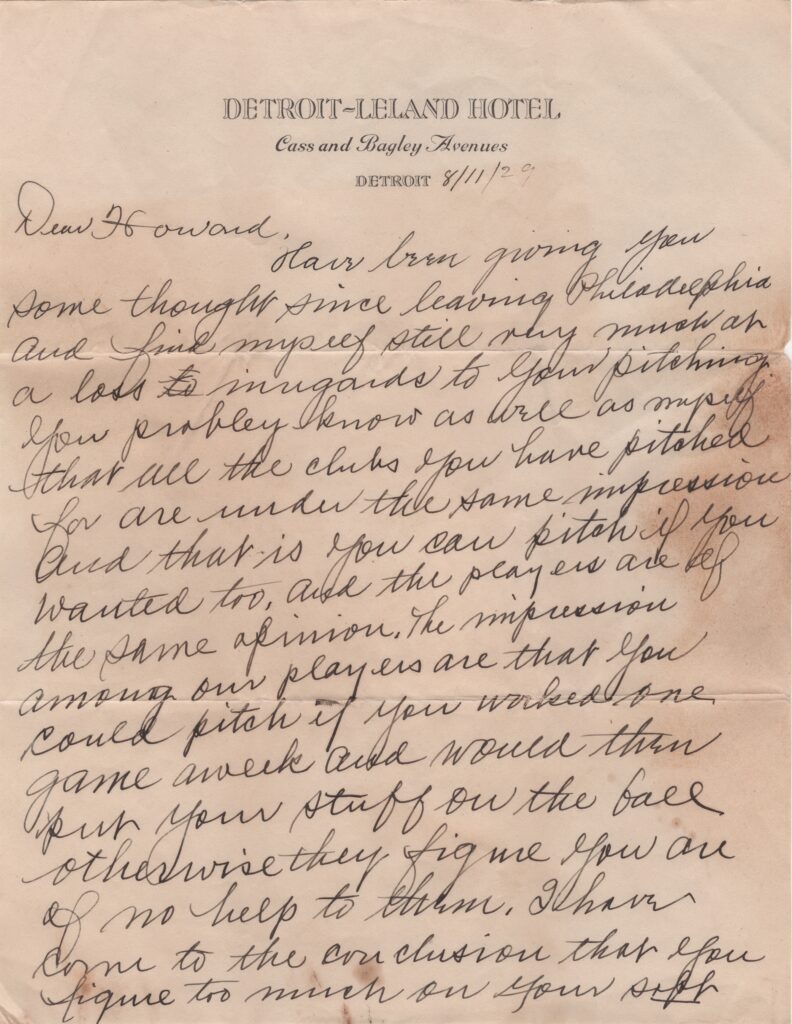
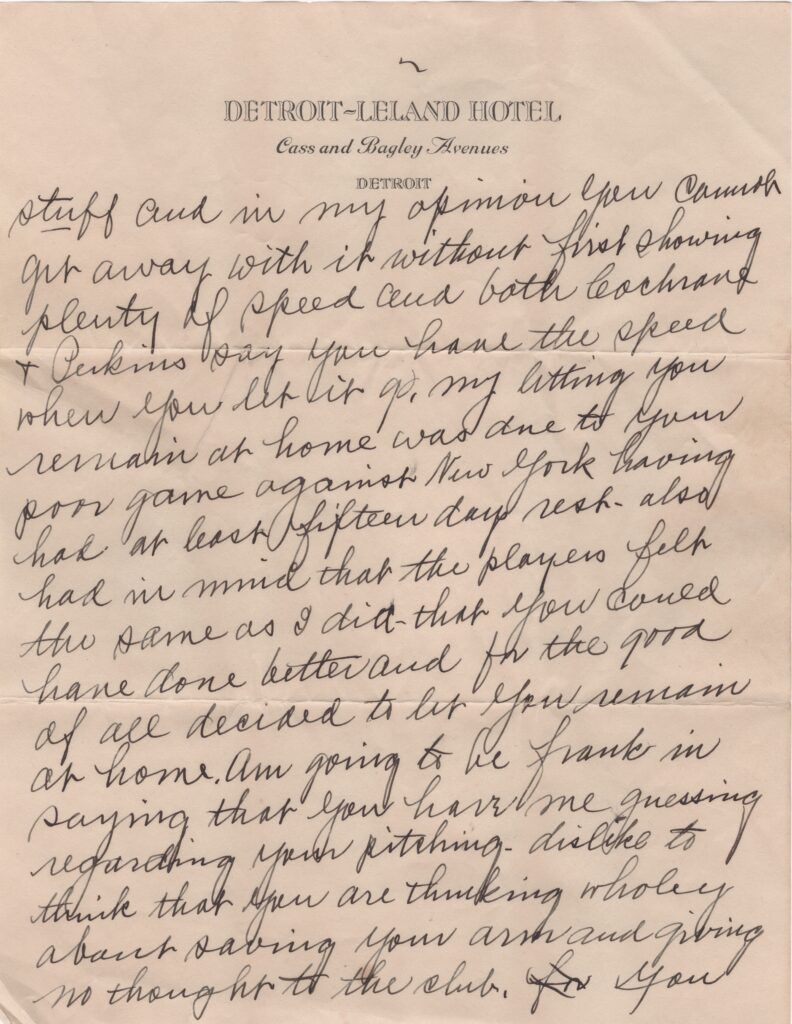
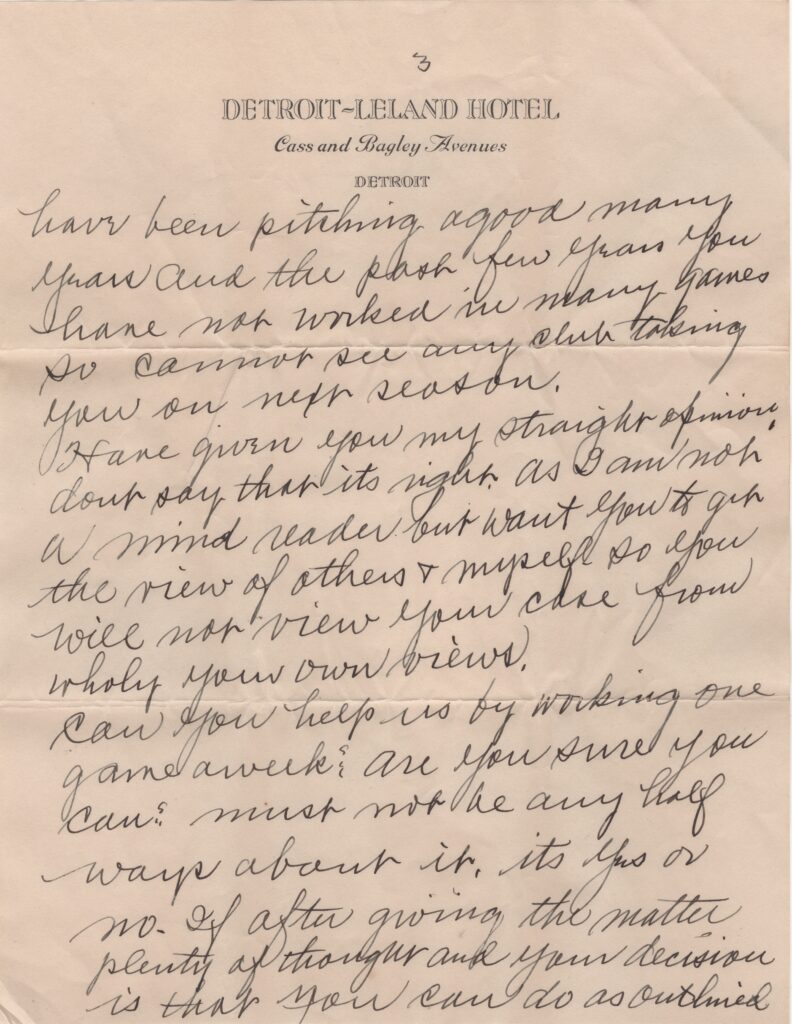
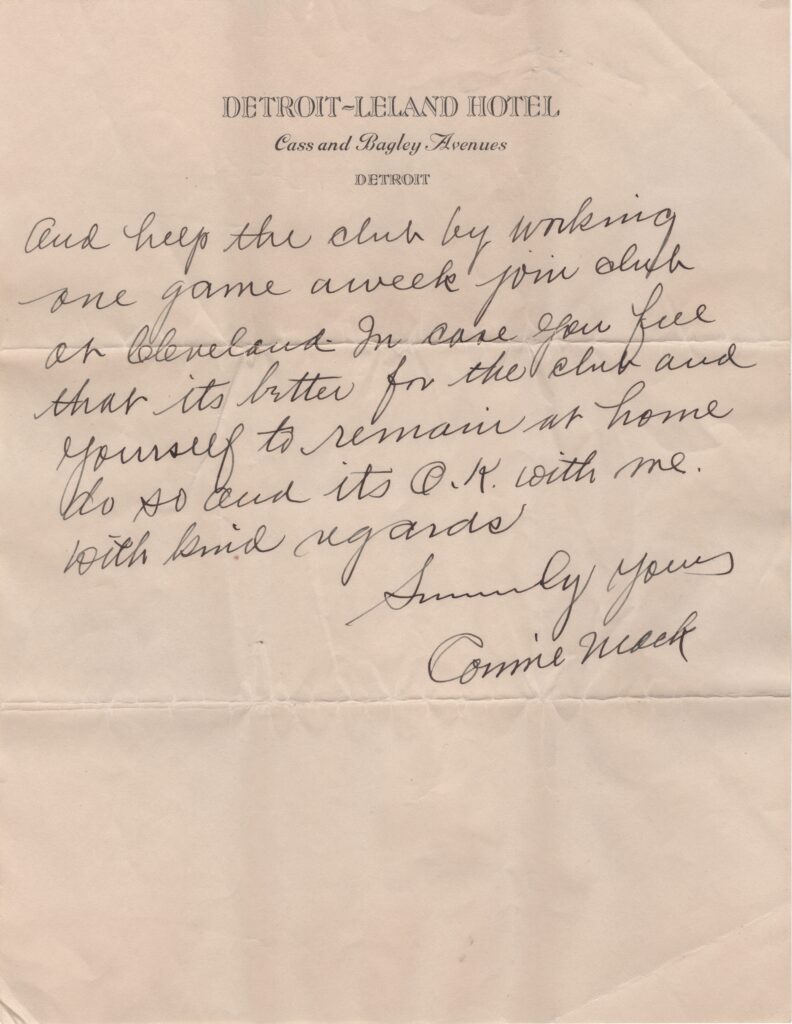
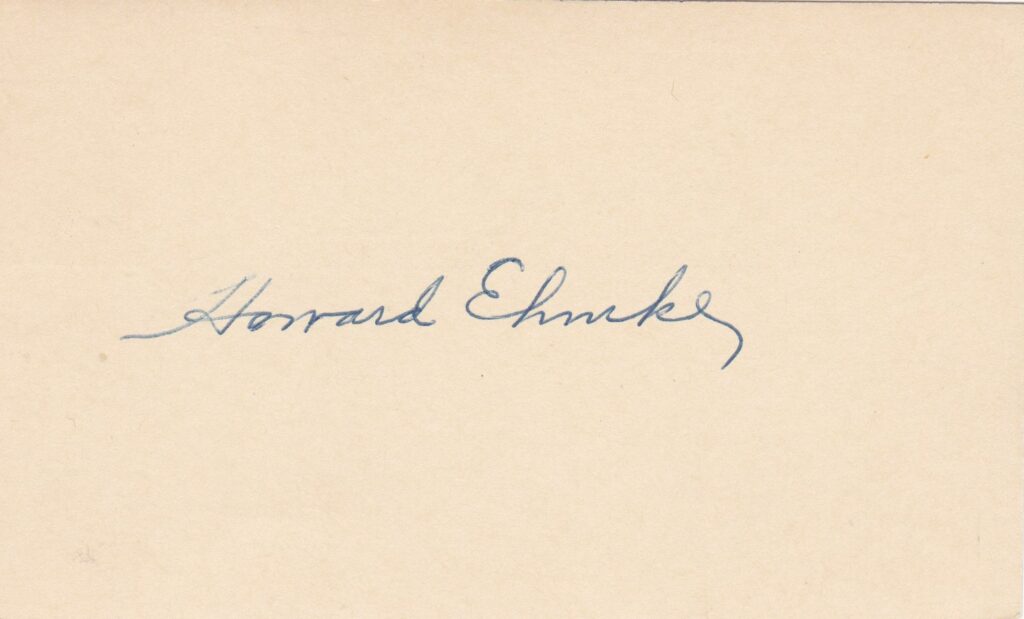
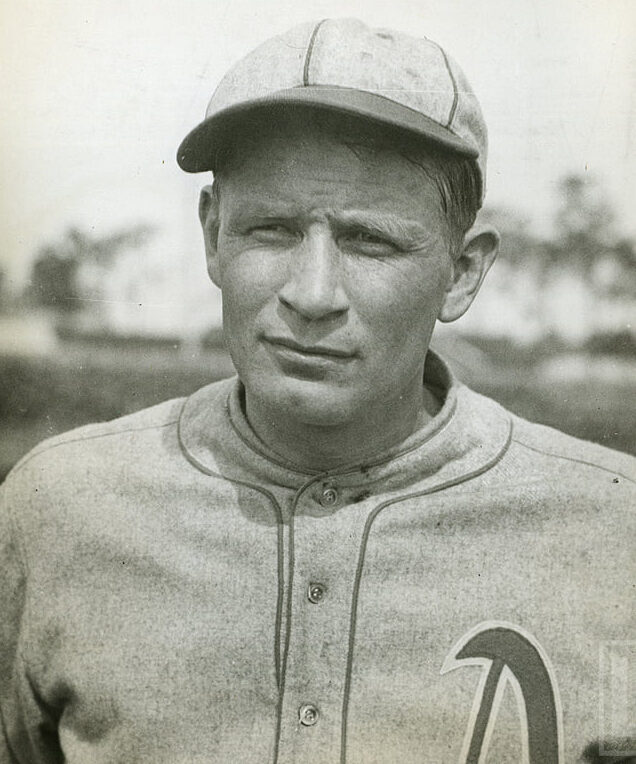
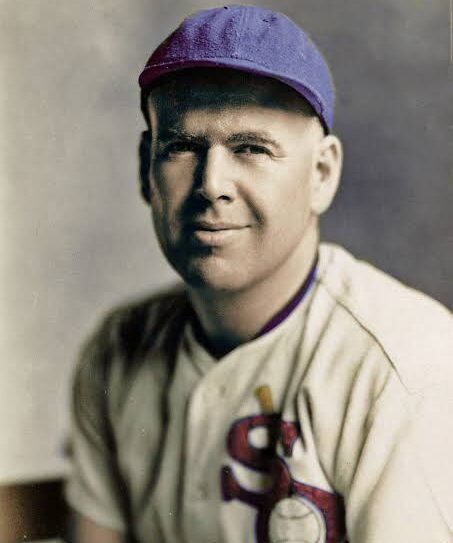
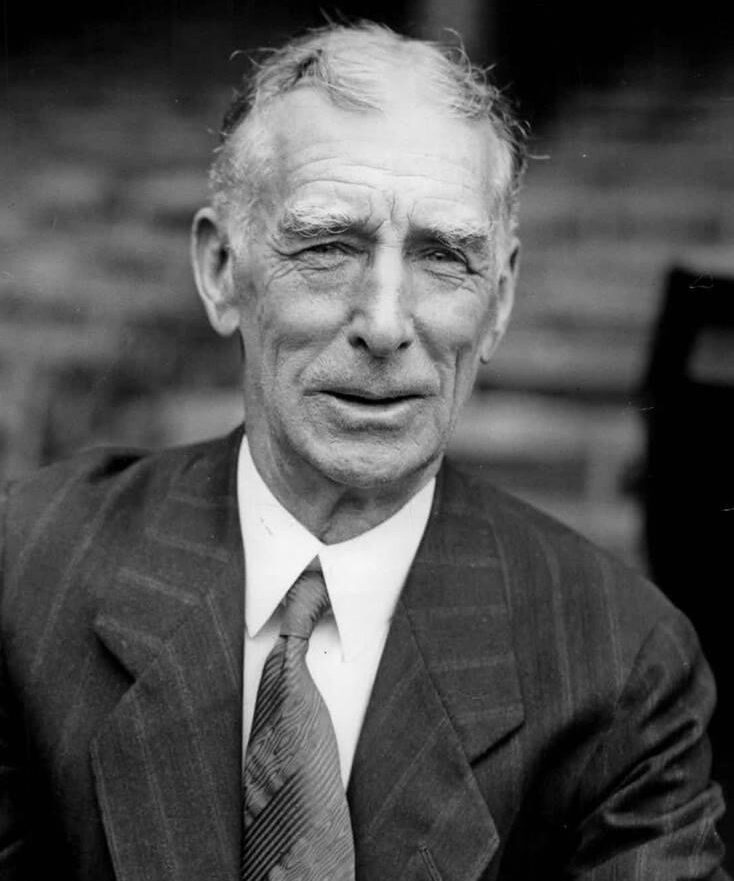
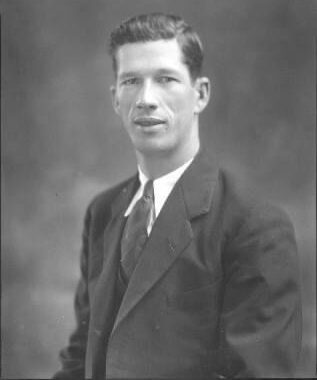
Jim,
What an informative piece with a “behind the scenes” look into that historic managerial decision!
The letter has found the perfect home, in the Cooperstown Expert’s museum.
This is the most comprehensive article I have
read on a singular sports event. The only
comparable articles are coverages of famous and
not so famous military battles.
I should add that this is not my first contact to
Howard Ehmke whom I first met in a late 1940s
book on great moments in World Series history.
Great story. As a Philadelphian but way too young to be around for the Athletics, I appreciate the history, not just baseball history, but American history. Well done.
I read about that memorable game in picture books as a kid. It was one of baseball’s most cherished moments. That letter is so full of emotion, which can be felt just by reading the copy. What a nostalgic trip back in time. Great historical content, and even mentions Ehmke’s catchers, Cochrane and Perkins.